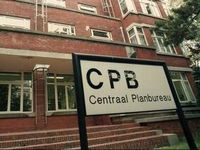
NL-3431 AK Nieuwegein
The Netherlands
phone : +31(0)30 60 35 640
fax : +31(0)30 63 00 333
e-mail: info@osict.com
Digital Archive for 'Centraal Plan Bureau'

Computable Best Business Case Award 2009 In the battle for the Computable best business cases 2009 Centraal Plan Bureau (CPB) also did an entry. The project "Digital Archive for CPB" is competing for the prestigious Computable Award.
The project and business case is the implementation of a digital archiving system. The choice fell on OpenIMS, an open source system that CPB itself can modify.
Centraal Plan Bureau
As a research institute, the Centraal Plan Bureau (CPB) has to comply to the regulations for reproducibility of scientific research. Furthermore, the CPB, as a public authority, has to comply with the Public Records Act and associated regulations. At this moment the CPB does not succeed to meet those requirements. The reasons are the separate archives they have (workproces storage, archiving paper at Post & Archive), lack of archiving standards and the increasing digitization, making communication more often go outside the Post & Archive departement.
Change management
CPB is the project owner. The supplier OpenSesame ICT delivers the development and implementation. The start date was April 1, 2009. Delivery of the pilot system was on September 1, 2009. During the pilot an active user group was involved. The exact workload was not exactly quantified, but a rough estimate leads to five months work for all involved. Objective of the project is to integrate and share files electronically. There is also an important change management aspect. Users will not be forced to use the system; if they also want to use the available fileserver storage, they are allowed to use that also. Nevertheless, for formal documents like scientific research reports the use of the digital OpenIMS archive is mandatory.
"The strategy of the approach was to implement a system that is userfriendly and easy to learn so users naturally switch from the classic fileserver to the digital OpenIMS archive," said Bertha Brouwer, project leader at the CPB. "The idea was not only to implement a digital archive solution, but also to provide our employees support during the workproces with document management, DMS, functionality. As users become familiar with the DMS, they also will archive their excisting files much faster.
Stakeholders
The main stakeholders are the users and management. Also the ICT department plays a role. Another stakeholder is the National Archive, which has an interest in transfer of accessible, well-organized files. It is not yet clear whether the stakeholders are satisfied, because the pilot phase is still ongoing. Brouwer: "The preliminary impression is that users, after initial hesitation, are using the system intensive. The management seems happy about the increased reproducibility of scientific research. What we see is that users create their own organization structures. Here is a tension between the user whishes and desired requirements of accessibility and organization. "
"This project is innovative because it not only stores static files (archive) but also files that 'change' during the working process," said Brouwer. " If we succeed in accountable researchers, so that they capture their work in this system, we achieve a lot. Scientists are somewhat reticent from nature when it comes to work within a framework. In the project approach the degree of voluntariness and flexibility is innovative. Users are, except with formal files, never forced to anything, and they have a high degree of flexibility to order their information at their own insight. "
New information
Much time was spent to investigate if a self-built system would be possible. When that choise fell off we invested a lot of time finding a suitable system and supplier that suited the specific requirements of the CPB (with data and models in "exotic" formats). In that period we had intensive contact with the internal client (the vice president responsible for our business). Later, we also made contact with the head of the sector where the pilot should run. In outline, this was very positively. Less successful was clearing the scope on time. During the project new information frequently popped up, which not always was responded adequately. For example, the functionality for e-mail archiving and sharing with others is not yet fully implemented, although this is important functionality.
Brouwer: "The main learning point for me as a projectleader is that I have to discuss disagreements with the internal client in an early state. Next time, I would also formulate clearer what expectations we have in the field of consultancy. Consultancy did not always go as we wanted, but afterwards I thought that I did not asked that clear enough. "
Source (in Dutch): Computable
About OpenSesame ICT
OpenSesame ICT is a Dutch software company that focuses on the creation of knowledge intensive business solutions based on the Open Source platform. These solutions are delivered under the name OpenIMS and SugarCRM. With several projects on Content, Document, Knowledge, CRM and Workflow Management OpenSesame ICT has proven to deliver outstanding solutions for knowledge and information management. For more information please contact Mr. E. van Korven (Business Development Manager) bdm@osict.com or visit the websites www.osict.com and/or www.openims.com.
